#PhD Thesis Help
Explore tagged Tumblr posts
Text
Academia tumblr, how do you find your phd topic?
#i really wanna get a phd in english/american literature or translation studies#dark academia#phd#phd student#phdjourney#phdblr#phd life#phd research#phd thesis help#phd studyblr#phd guidance#academia#studyblr
51 notes
·
View notes
Text
quick question to the lit majors/scholars:
what comes after postmodernism? is it metamodernism or something else? if so, what are the recurring narrative styles/genres that sets it apart from postmodernism?
welp.
pls share this with your well-read friends who might know the answer. i wanna know everyone’s opinions.
#literature#english lit studyblr#studyblr#study blog#literature memes#english lit memes#english lit student#lit major#literary criticism#english literature#literary theory#literary fiction#english#postmodernism#metamodernism#lit#real academia#academia#art academia#literature major#phdblr#phd life#phdjourney#phd research#phd student#phd thesis help#phd adventures#phd candidate#phd guidance#phd studyblr
30 notes
·
View notes
Text
Thriving in Research and Academia: A Guide for Aspiring Scholars
Research and academia are the lifelines of human development. They promote innovation, critical thinking, and the dissemination of knowledge. For graduate students entering this world, it is a mixed experience: both exciting and terrifying. Thus, here is a complete guide to thriving in research and academia.

1. Selection of Research Topic
Of course, "choosing a research topic" is the corner stone of your academic journey. Passion and practical considerations must be balanced here:
Interest: Choose that which genuinely excites you. Passion fuels persistence.
Relevance: Research addresses a real-world problem or reflects an area currently lacking within the existing literature.
Feasibility: Resources, time, and expertise involved in this study.
A well-defined focused research question becomes very much better than an extremely broad one.
2. Creating a Strong Research Base
Good research starts with good foundation work.
Literature Review: Pore over relevant research to grasp the present state of your field.
Methodology: Choose relevant research methods: qualitative, quantitative, or mixed methods, aligning with your research question.
Tools: Get familiar with statistical software, citation managers, or data visualization platforms.
3. Navigating Academic Barriers
The academic journey isn't without its obstacles. Here's how to navigate some of the most common barriers:
Time Management: Prioritize tasks and set realistic deadlines. Tools like planners and apps can help organize your schedule.
Impostor Syndrome: Remember that self-doubt is common. Seek mentorship and celebrate small victories.
Publication Pressure: Focus on quality over quantity. Publishing in reputable journals is more impactful than chasing numbers.
4. Networking and Collaboration
Research is not a solitary endeavor. Building connections within the academic community can open doors to mentorship, collaboration, and opportunities.
Attend conferences and workshops to present your work, and learn from the work others present.
Communicate and interact with fellow students and your professors. Conversations often spark new ideas.
Utilize online tools such as LinkedIn and ResearchGate in order to strengthen your professional connections.
5. The Significance of Distribution
Publication of your research is an integral part of the academic experience.
Peer-reviewed publications: Strive to publish in appropriate peer-review journals for your field of interest.
Conferences: Attend academic conferences to present your work.
Outreach: Write blogs, do public talks, or even create videos to make your research available for a broader audience.
6. Maintaining Personal Well Being
While hitting the stress level of achieving perfect academic scores, look after health and well-being.
Boundaries: Do not overcommit. Learn how to say no.
Take Break: Having regular breaks can improve productivity and creativity.
Seek Support: Find a support group or consulting with a professional when necessary.
Final Thought
Research and academia involve hard work and rewarding process. Only with passion, resilience, and strategic planning can one shine well in this domain. Remember, for every setback, one learns; for every success one approaches making a difference in the world.
So, in this moment, embrace the process; stay curious and let your journey through academia be that of growth and discovery.
For further research assistance reach out to us on our whatsapp https://wa.me/919424229851/
0 notes
Text

Are you a Ph.D. student struggling with your thesis writing in Germany? 📚 Our expert team can help you craft a top-notch thesis that meets all the academic standards. 🌟 Let us guide you towards success and achieve your academic goals! 👉Our top priority is to help you succeed in your academic goals in Germany. 👉 So why wait? Contact us today at +91 9041262727 or 👉email us at [email protected]. Website: http://www.e2matrix.com/
0 notes
Text
Expert PhD Thesis Writing Help in Dubai: Professional Guidance for Your Academic Success

Looking for reliable PhD thesis writing help in Dubai ? Our expert academic writers provide personalized support to ensure your research meets the highest standards. We offer comprehensive services, from topic selection to final editing, tailored to your specific needs. Trust us to guide you through every stage of your PhD journey and achieve academic excellence.
0 notes
Text
Trusted PhD Thesis Writing Services in UK Need help with your PhD thesis? Our thesis writing services offer expert assistance, ensuring a well-structured and top-notch PhD thesis. We have A grades Team of 4500 assignment writers to help with your PhD thesis at affordable price. Get started now.
#phd thesis writing service#phd thesis writing services#phd writing service#phd thesis help#phd thesis writing help
0 notes
Text
https://youtube.com/clip/UgkxdFrkbsRiblq6GCs_MnuGroW3Iaor1b1w?si=15J7zDwjfMokMQIh
This is my question for the Amsterdam q&a!!! Thank you Dan for saying hell yeah and then immediatly insulting me <3 and thank you Phil for your answer I was not expecting less I love you
#I think I will quote Phil in my phD thesis it's too good#thank you Phil for helping me out we'll share the nobel price <3#also Phamsterdam it's been a blast I already miss you#dan and phil#phan
21 notes
·
View notes
Text
Guys, we're supposed to make a thesis and new inventions, so far we have thought of soap, creating a new religion, going back in time to kidnap Albert Einstein and making a bomb so big it makes another big bang theory
If you guys give me ideas, I will update 3 chapters continuously, or if you want, give me an invention idea and I will write a head cannon you want 2000 words max
It's a promise.
#thesis#please help#send help#im dying#project#school#inventions#im begging you#bomb#time machine#author#scientist#pls#inventor phd#phd#college#i cannot fail#warmyanderepjoxdc#fan fiction#struggling author#dead dove do not eat#i really need an invention
26 notes
·
View notes
Text
just realized i've pissed away my entire degree due to cringefail medical issues

#:)#did the mathematics on the best case scenario (transplant waiting list with live donor) and i still wouldn't be fixed until after graduatin#like sure i could probably easily get the thesis done over a handful of Good Days but every other peripheral phd activity is lost to me ^_^#girl the work experience.....the publishing opportunities..............girl help#i guess Not Dying is pretty important but also i'm critically aware of what happens if i do survive#and that's coming back into the healthy world at 30 with no meaningful employment experience and no further education to fall back on#like. a phd on its own is really not worth shit! it was all the other auxiliary qualifications along the way that would've helped me#spiraling rn because my supervisor told me he Really Can't put off my transfer by any longer than another month#and my distressed ass is NOT in the headspace to present my research
8 notes
·
View notes
Text
How Does The Brain Work?
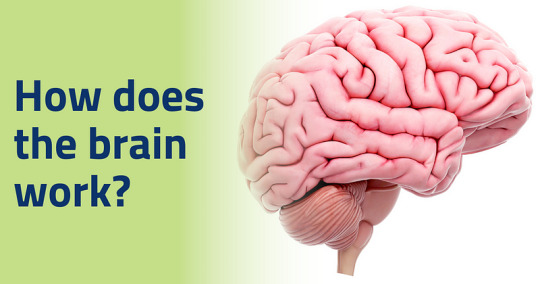
The brain stands as a marvel of biological engineering, Composing of a multitude of bodily functions ranging from cognition and memory to emotions and sensory perception. Together with the spinal cord, it constitutes the central nervous system (CNS), the command center of the human body.
Composition of the Brain
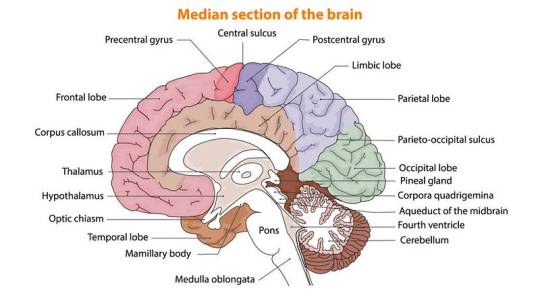
Weighing approximately 3 pounds in adults, the brain’s main structure comprises about 60% fat, interspersed with water, protein, carbohydrates, and salts. Unlike muscles, it houses a complex network of blood vessels and nerves, including neurons and glial cells.
a) Gray and White Matter
Within the central nervous system, gray matter and white matter occupies distinct regions. In the brain, gray matter forms the outer layer, rich in neuron somas, while white matter constitutes the inner section, primarily composed of axons unsheathed in myelin. Conversely, in the spinal cord, this arrangement is reversed.
b) Brain Functionality
The brain operates by transmitting and receiving chemical and electrical signals throughout the body. These signals regulate a myriad of processes, with the brain disseminating each input. Some signals remain confined within the brain, while others traverse the spinal cord and nerves, disseminating information across the body’s expanse. This composes neural network relies on billions of interconnected neurons.
Major Brain Regions and Their Functions
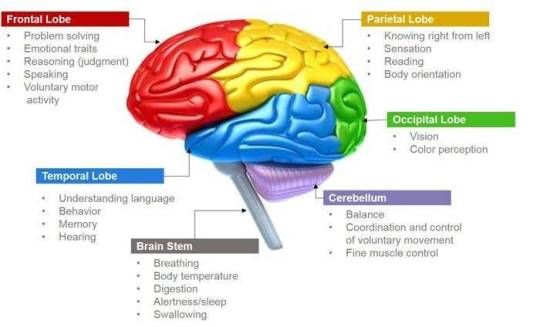
1.Cerebrum
Dominating the brain’s landscape, the cerebrum encompasses the cerebral cortex and underlying white matter. It governs a spectrum of functions, including motor coordination, temperature regulation, language processing, emotional regulation, and sensory perception.
2. Brainstem
Serving as the bridge between the cerebrum and spinal cord, the brainstem comprises the midbrain, pons, and medulla. It regulates vital autonomic functions such as heart rate, breathing, and reflexive responses.
3. Cerebellum
Nestled at the posterior aspect of the brain, the cerebellum coordinates voluntary muscle movements, posture, balance, and motor learning.
Brain Coverings
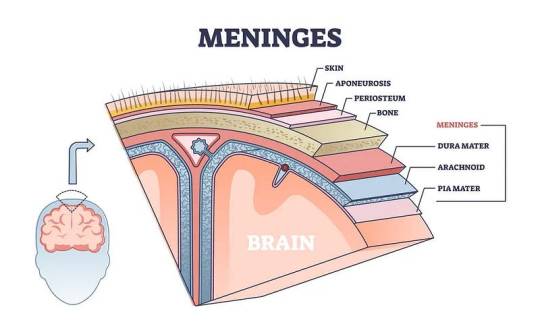
a) Meninges
Three layers of protective membranes, collectively known as meninges, enshroud the brain and spinal cord. These layers — dura mater, arachnoid mater, and pia mater — shield the delicate neural tissue from physical trauma and infection.
b) Lobes of the Brain
Each hemisphere of the brain comprises four lobes, each harboring distinct functional domains:
Frontal Lobe: Governing executive functions, motor control, and higher cognitive processes.
Parietal Lobe: Integrating sensory information, spatial awareness, and perception of pain and touch.
Occipital Lobe: Specialized for visual processing and perception.
Temporal Lobe: Involved in auditory processing, language comprehension, and memory consolidation.
Deeper Brain Structures
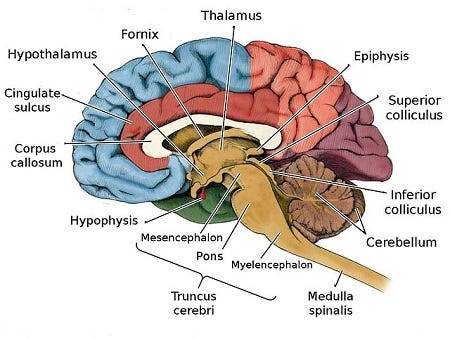
These encompass important structures such as the pituitary gland, hypothalamus, amygdala, hippocampus, and pineal gland, orchestrating hormone secretion, emotional regulation, memory consolidation, and circadian rhythms.
Blood Supply
The brain receives its oxygenated blood supply through the vertebral and carotid arteries, ensuring adequate perfusion of neural tissue. The main network of blood vessels, including the Circle of Willis, safeguards against ischemic insults and facilitates intraarterial communication.
Cranial Nerves
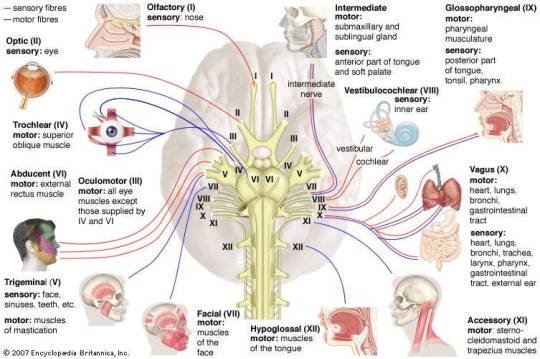
The twelve pairs of cranial nerves, originating from the brainstem, mediate a diverse array of sensory and motor functions, encompassing olfaction, vision, facial expression, and auditory perception.
Comprehending the anatomy and functionality of the brain fosters a deeper appreciation of its complexity and facilitates advances in neuroscientific research and therapeutic interventions aimed at diminishing neurological disorders.
Understanding the detailed anatomy and functionality of the brain is crucial for medical students embarking on their journey of study. Expert Academic Assignment Help offers invaluable assistance in navigating the complexities of neuroscience and related subjects. By leveraging expert guidance and support, students can excel in their medical education and contribute to advancements in the field of Medicine. Email us at [email protected] to embark on your path to scholarly excellence and professional competency.
#studying#studyblr#study blog#study aesthetic#student life#student#medical student#medical school#medicine#university student#university#university life#assignment help#medical students#nursing student#nursing school#healthcare#health and wellness#mental health#psychology#phd life#phd thesis writing service#online writing#do my online class#academic writing#essay writing#academic assignments#academia
15 notes
·
View notes
Text
How to Conduct a Literature Review Using Digital Tools (with Notion Template)

Embarking on a literature review is a fundamental component of academic research that can often appear overwhelming due to the sheer volume of relevant articles and sources. However, leveraging digital tools like Notion can substantially streamline and enhance this process. By providing a structured approach, Notion enables researchers to manage their literature reviews with greater efficiency and organization. This comprehensive guide will walk you through a methodical literature review workflow using Notion, explore various digital tools, and offer a Notion template to facilitate your research.
The Benefits of Using Notion

Notion is an advanced organizational tool that integrates the functionalities of note-taking, project management, and database creation into a single platform. Its versatility is particularly advantageous for managing a literature review. Here are several key benefits of using Notion:
Integration of Pages and Databases: Notion allows for seamless linking of pages and embedding of databases within other pages. This interconnected structure facilitates comprehensive data management and easy navigation between related information.
Customizable Filters and Sorting: Users can create custom properties and apply filters to databases, which enables sophisticated sorting and retrieval of data tailored to specific research needs.
Efficient Data Management: Notion supports the transfer and management of data from Excel sheets, enhancing the organization and accessibility of research materials.
In my workflow, Notion plays a central role through two primary databases: the ‘literature tracker’ and the ‘literature notes’ matrix. These databases are instrumental in tracking papers and synthesizing information to construct a coherent argument.
Stages to Literature Review Workflow

1. The Literature Search
The initial phase of a literature review involves a systematic search for relevant sources. This step is critical for building a comprehensive and well-rounded review.
Identify Keywords: Begin by developing a list of keywords that are pertinent to your research questions. Engage with your supervisor or colleagues to refine this list, ensuring it encompasses all relevant terms. As you progress, be prepared to adjust your keywords based on emerging research trends and findings.
Utilize Database Search Tools: Employ established databases such as Web of Science, Scopus, Google Scholar to locate pertinent literature. These platforms offer extensive search functionalities and access to a broad range of academic papers. Additionally, set up email alerts for new publications related to your keywords. This proactive approach ensures that you remain informed about the latest developments in your field.
Library Building and Recommendations: Manage your literature library using tools like Mendeley, which facilitates the organization of references and offers recommendations for related papers. Mendeley’s sharing capabilities also enable collaboration with colleagues, enhancing the collective management of research resources.
2. Literature Mapping Tools

Literature mapping tools are invaluable for visualizing the relationships between papers and identifying key research themes.
Citation Gecko: This tool constructs a citation tree from ‘seed papers,’ illustrating the connections between various studies through their citation relationships. It is particularly useful for uncovering seminal works and understanding the progression of research topics.
Connected Papers: Connected Papers uses a similarity algorithm to generate a graph of related papers based on a given key paper. This tool provides insights into related research that may not be immediately evident through direct citation links, helping to broaden your understanding of the field.
3. The Literature Tracker
An organized literature tracker is essential for managing and reviewing research papers effectively.
Organize with Notion: Utilize Notion’s customizable properties to document essential details of each paper. This includes metadata such as title, author, publication date, keywords, and summary. The ability to filter and sort this data simplifies the process of managing large volumes of literature.
Database Views: Notion offers various database views, such as the kanban board, which can be used to track your reading workflow. This visual representation aids in monitoring your progress and managing tasks associated with your literature review.
4. The Literature Synthesis Matrix
The synthesis matrix is a crucial component for organizing and synthesizing information from the literature.
Second Pass of Papers: After an initial screening, populate the ‘literature notes’ database with detailed information from the papers you deem relevant. This should include comprehensive notes on the paper’s summary, key results, methodology, critiques, and any future work suggested.
Relational Databases: Leverage Notion’s relational database capabilities to link related papers and create a synthesis matrix. This matrix helps in identifying connections between different studies and assists in constructing a coherent narrative for your literature review.
5. Writing Your Literature Review

Writing a literature review involves synthesizing the collected information into a structured and insightful analysis.
Identify Research Themes: Use your literature matrix to pinpoint key research themes and questions. These themes will form the basis of your literature review sections and guide the development of your thesis statement(s).
Summarize and Evaluate Sources: Focus on the most significant sources for each theme, summarizing their key points and critically evaluating their contributions. This involves assessing the strengths and weaknesses of each study and linking related research to provide a comprehensive overview.
Situate Your Research: Clearly articulate the research gap your study addresses, justifying your research approach based on the identified gaps and the synthesis of the reviewed literature.
6. Iterating Your Literature Review
A literature review is a dynamic process that requires regular updates and revisions.
Regular Updates: Continuously update your literature review as new research emerges. Balance the time spent on reading with the progress of your own research to ensure that your review remains current and relevant.
Notion Template
To facilitate your literature review process, I have developed a Notion template that includes:
A Literature Tracker Database: For recording and managing details of relevant papers.
A Literature Notes Database: For detailed notes and synthesis of the literature.
Predefined Properties: For filtering and sorting entries according to specific research needs.
You can duplicate and customize this template to fit your research requirements.
Useful Resources
Here are some additional resources that can aid in the literature review process:
The Literature Review: Step-by-Step Guide for Students
3 Steps to Save You From Drowning in Your Literature Review
How to Write a Literature Review
How to Become a Literature Searching Ninja
Mind the Gap
7 Secrets to Write a PhD Literature Review The Right Way
By following this structured approach and utilizing digital tools like Notion, you can streamline your literature review process, enhance organization, and ensure that your research is thorough and well-founded. This methodology not only simplifies the review process but also provides a robust framework for developing a strong thesis or dissertation.
Investing in your academic future with Dissertation Writing Help For Students means choosing a dedicated professional who understands the complexities of dissertation writing and is committed to your success. With a comprehensive range of services, personalized attention, and a proven track record of helping students achieve their academic goals, I am here to support you at every stage of your dissertation journey.
Feel free to reach out to me at [email protected] to commence a collaborative endeavor towards scholarly excellence. Whether you seek guidance in crafting a compelling research proposal, require comprehensive editing to refine your dissertation, or need support in conducting a thorough literature review, I am here to facilitate your journey towards academic success. and discuss how I can assist you in realizing your academic aspirations.
#gradblr#academics#education#grad school#phd#phd life#phd research#phd student#phdblr#study#studyspo#students#studyblr#studying#student#study motivation#study blog#university student#uniblr#university#dissertation help#dissertation writing#dissertation abstract#dissertation topics#phdjourney#graduate school#thesis writing#thesis help#thesis tag#thesis statement
6 notes
·
View notes
Text
Work-Life Balance in a PhD Program: Is It Possible?
For many academics, a PhD program is the greatest challenge they can take on-a grueling, hours-long, research-intensive endeavor that sometimes feels like all-consuming. For too many PhD students, the answer to work-life balance has seemed a chimeric dream. When should one dedicate time to coursework, research, teaching, and writing?
The good news is that achieving a work-life balance during a PhD is possible by setting up the right strategies and mindset. Here's a guide in understanding the unique challenges of PhD life and practical tips to achieve balance, reduce stress, and find time for what matters outside academia.

1. Understanding the Nature of PhD Work
The workload associated with PhDs can be incredibly unpredictable; it will go through cycles of really stressful periods like when grant applications are due or major presentations, but then also into periods that may feel more free. It is challenging to try to have any sort of life and work in the more stressful periods, so it would be helpful to understand this rhythm going into the program and begin making plans for it.
Questions to ask yourself:
When are the busier times in my program?
How will you use less busy periods to recharge?
What are the non-negotiable deadlines and requirements?
Now that you know the demands of each phase, you can create a more adaptive schedule that helps you prioritize well-being when possible.
2. Set Boundaries and Stick to Them
Doing PhD work tends to blur "work" and "life" boundaries, especially when research or writing can be done anytime and anywhere. So, set some boundaries that allow you to disconnect and recharge by considering:
Create a routine: Do identify certain hours in a day as working, and then promise personal time to be available in the evenings or on weekends.
Establish space-based boundaries: Whenever possible, clearly demarcate an area for academics, such as an area at home for studying or a lab, and avoid working in relaxation spaces.
Reach out to your advisors and colleagues: Politely inform them that you will answer emails or work-related matters at given times thus setting healthy expectations regarding availability.
Good boundaries can, of course, create a gap between the kind of work one does during the PhD period and at home and hence better safeguards separation between work and life.
3. Care for Your Body and Mind
Good physical and mental health require achievement of a work-life balance. The workload can pile up very fast in a PhD program and so requires some time for well-being activities.
Do exercise: Exercise enhances both concentration and mental stamina. Including a short daily walk can be refreshing.
Mindful meditation or practice: Most students find that meditation or mindful breathing can calm down stress and also improve their focus.
Seek help when you need it: If the weight of your PhD pressures you, do not fear seeking mental health services on campus or counseling.
Spending time on health can become a luxury when one has to give up less time for research; however, a healthy refreshed mind is much more productive and resilient in the long run.
4. Set Realistic and Flexible Goals
Most of the PhD students are encouraged to set challenging goals and actually come to fulfillment of them, but it is also very important to understand what one can reasonably accomplish during a specific timeframe. Therefore, set achievable goals and adjust as required:
Help break down big tasks: Dividing research, writing, or coursework into smaller and manageable tasks can help prevent feeling overwhelmed.
Focus on the targets of the week and month rather than focusing on the long-term deadlines. These can help keep the track of steady progress.
Re-evaluate and modify: If you've achieved some progress, review yourself and then alter your goals based on what's practical. Flexibility will keep you motivated rather than frustrated.
Realistic goals create manageable workloads and provide the sense of accomplishment that is so important to balancing your personal and academic life.
5. Carve out Space for Pastimes and Social Ties
It's easy, in a PhD pressure cooker, to let hobbies, friendships, and family time fall by the wayside. But relating to those who are outside the hallowed halls of academia can be the difference between having any semblance of a balanced life. Try:
Set time for hobbies: As humans, hobbies can be really great ways to relax and recharge. Whether you get yourself painting; play an instrument, you join a sports league or anything else, the key thing is to do something for yourself.
Time spent with family and friends: Social connections help one mentally. Make an effort to stay in touch with loved ones. It might not be possible to spend time with them regularly, but even a quick phone call or a weekend visit would count.
Take breaks in the day: Whether it is a coffee with a friend or a walk around campus, small breaks throughout the day can provide valuable mental refreshment.
Making time for interests and relationships outside of academics can help create a balance in life, and this can offer a fresh perspective about your work.
6. Know When to Say No
A PhD offers many opportunities--extra teaching jobs, research projects, participation in conferences, and so many more. Importantly, some of these can be very enriching experiences. Know when to say "no," for example, when:
Opportunity falls outside of your major research or priorities.
You already have too many tasks on your plate.
It would be impossible for you to balance work and life commitments.
Politely declining may help protect your time and energy so you can focus on what counts while avoiding burnout.
7. Find Peer Support
Doing a PhD can feel quite lonely, especially when way down in the trenches of independent research. But connecting with others, even if it is too briefly, can create an illusion that you are not alone in this journey. End
Joining study groups: Regularly meeting with others to discuss problems, offer advice, or collaborate can be incredibly helpful and inspiring.
Attending academic or social events: Academic events like conferences or departmental gatherings may be an opportunity to discuss research but also provide you with social life.
Building a support network: Connect with colleagues who know what it is like to face the rigors of PhD studies. These friends can provide some invaluable support when things become difficult.
A good support structure makes the PhD journey worthwhile and lets you know that someone else understands.
8. Flexibility and Self-Compassion
Work and life balance during a PhD will not always be perfect. There will be periods when work demands much of your attention and times when personal matters may take priority. Learn to be flexible and give yourself grace when finding balance seems impossible. Remember:
Not every day will be created equal: Some days will be more terrible than others. Be easy on yourself and realize success does not come overnight.
Breaking is not fruitless: It is okay to step away from a project. This is necessary for long term success, not short term.
You can commemorate small wins: PhD work is a slow -moving affair, so enjoy the small victories, like completing a draft of a chapter or presenting at a conference.
Self-compassion provides a means of reducing perfection pressure and promoting a more balanced approach to the PhD journey.
Final Thoughts
A healthy work-life balance is difficult to keep up during a PhD program, but it can definitely be done. That is so by boundaries being put and health being prioritized, setting realistic goals, and embracing support. This, in return, will yield a very fulfilling and sustainable balance that would be to your advantage both at personal and academic levels. You must not forget that a balance between work, studies, and life does not mean you should do it all at once; rather, it is having a certain rhythm that works perfectly for you, allowing you to thrive in both the academic world and your life outside of it.
The demands of a PhD program can be managed if you have the right strategies and mindset, hence you will manage to have room for what makes life worth living- relationships, hobbies, and experiences.
For further research assistance reach out to us on our whatsapp https://wa.me/919424229851/
0 notes
Text

Elevate your business management PhD thesis with our precise data analysis services. 📊💼 Let's turn your research into actionable insights!
Contact us at 9041262727!
0 notes
Text
The Dissertation Journey and Your Mental Health

The journey of a dissertation can often feel astonishingly solitary, an experience compounded by the weight of stress, anxiety and daily worries. It was precisely this sense of isolation that compelled me to become a dissertation coach, with the goal of transforming the solitary odyssey into more of a shared pilgrimage.
I clearly remember the overwhelming sense of responsibility and the looming uncertainty that clouded some of my time as a PhD student. Yet throughout it all, it was essential to remember that I was not alone. I relied heavily on my own dissertation coach, project supervisor, peers in the program and family to remind me that this particular academic challenge was, in fact, worth it. Read more: https://dissertationcompletecoaching.com/the-dissertation-journey-and-your-mental-health/
#phd dissertation coaches canada#dr. cara weston#thesis writing help canada#dissertation coach near me
2 notes
·
View notes
Text
they should give me adderall just to see what happens
#cro zone#my dream is to have an insane med student going for a phd who is willing to run every test in the book + some new ones they made up#could be a sex thing but mostly i just want to know. plus if they needed help writing their thesis im pretty good at that
2 notes
·
View notes
Text
my great grandfather in his war journal after surviving the most harrowing aspects of becoming a prisoner of war in ww2:

#humor#shitpost#lol#pls help#lotr memes#ww2#prisoner of war#POW#war journal#thesis#university#academics#grad school#phd#textbooks
17 notes
·
View notes